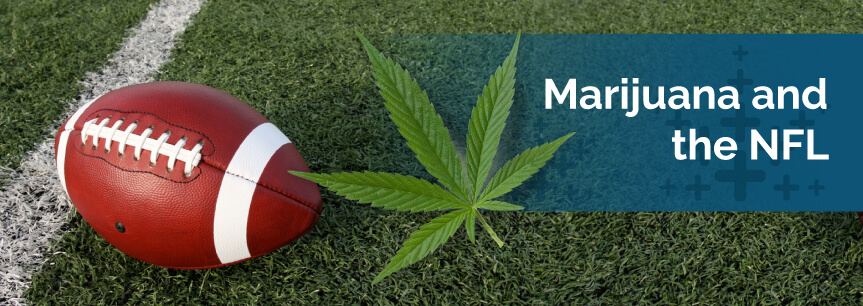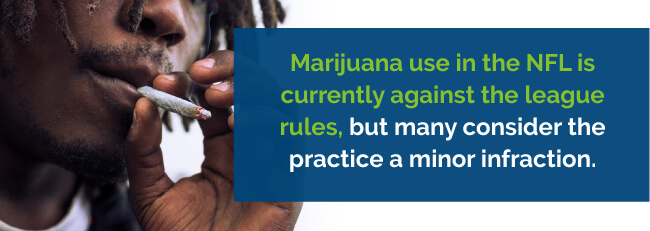
There is no doubt professional football players deal with a lot of pain. Despite their physical conditioning, NFL players push their bodies to perform, sometimes beyond their capabilities. Players often suffer muscle strains and sprains, bumps and bruises or the occasional concussion.
During a typical NFL career, a professional player consumes countless over the counter anti-inflammatories, powerful painkillers and other substances designed to shorten recovery time, reduce pain and increase physical performance. The Drug Enforcement Administration (DEA) is moving ahead with investigations into professional athletes’ dependence on drugs for pain relief, which may lead to federal litigation.
Marijuana, a proven natural pain reliever, is banned by the Federal Drug Administration (FDA) and the NFL. Considering the amount of pain experienced by NFL players and the concerns about addiction to pharmaceutical pain killers, players are increasingly calling for a new marijuana policy in the NFL.
Marijuana use in the NFL is currently against the league rules, but many consider the practice a minor infraction. Still, players are reluctant to talk about the use of marijuana. A telephone survey of 644 retired NFL players revealed some interesting information about the use of medical marijuana in the NFL:

Eugene Monroe, a former player for the Baltimore Ravens, expressed openly at the age of thirty that he could feel the side effects of the painkillers. They damaged his body, and, at some point, stopped working to reduce his pain. The Baltimore Ravens retired Monroe after he became the first player on the team to ask the league publicly to allow medical marijuana usage in the NFL. Monroe also shared that after using different formulations of cannabis, he has regained some physical functionality and is able to get around with less pain.
The NFL has more outspoken proponents advocating the usage of marijuana and its medicinal properties than any other sports league. It’s also true that no other sport is as closely associated with physical pain and damage as football.
Most of the former players of the Broncos were disbelievers until recently. However, the more they came to know about the medicinal use of marijuana, the more they began to treat it as the cure for their uncooperative knees, sore backs, insomnia and throbbing headaches.
Among 226 NFL players surveyed anonymously, 75% support the legalization of the use of medical marijuana worldwide. However, around half of the players said they would still use painkillers even if they could use marijuana for medical purposes.
According to the survey, most players are worried about the prolonged risk of the painkillers. More than 40% of the athletes alleged one of their teammates is addicted to painkillers as a result of the widespread use and abuse of painkillers in the NFL.
The head injuries encountered by the players in football and related sports can sometimes be fatal. A series of continuous blows to the head can develop into Chronic Traumatic Encephalopathy (CTE), which involves the swelling of the brain and can be fatal. There is no way of knowing when the next concussion can turn to a fatal case of CTE.
The post-concussion syndrome that occurs due to head injuries is still not completely understood by medical professionals. The syndrome can last for a prolonged period and can vary or set in for an indefinite period. Post-concussion syndrome includes several disorders related to the brain, such as depression, change in personality, headache, vertigo, dizziness, restlessness and anxiety. The severity and number of concussions suffered is not a reliable indicator of post-concussion syndrome.
The rate of concussions suffered by the players is increasing with time. Recently, people have become extremely aware that concussions might also result in the structural damage of the fine nerve fibers inside the brain. A common misconception is that you’ve only encountered a concussion if you’ve fainted. Only 10% of the cases of losing consciousness are related to concussions. It can either occur when the ball comes in direct contact with the head, or through a whiplash injury. A whiplash injury can be sustained when some other part of the body is impacted, stopping the body while the head remains in motion until it reaches the full neck extension.
Medical marijuana usage in the NFL could help in balancing the endocannabinoid system of the players’ bodies by relaxing the central nervous system and easing the pain. It has analgesic, anti-convulsion, anti-psychotic, and anti-inflammatory properties that can reduce stress.
NFL players in chronic pain from injuries and degenerative conditions will continue to try new pain relievers until they find something that helps. Meanwhile, the chronic pain they suffer can be debilitating, keeping them from performing even simple daily tasks. Chronic pain, when left untreated, causes other physical and mental disabilities.
Some players try opioid therapy. Opioid medicines are extracts of poppy plant found in toxic drugs, like opium and heroin. Opioids are certainly lethal — therefore, its consumption brings adverse effects like dizziness, constipation, tolerance towards drugs, sedation, addiction and respiratory depression. These drugs are also highly addictive.
A study revealed that the annual death rates of people who use opioids as painkillers are more than those who use medical cannabis. Cannabis is a safer option — there are no reports of overdose deaths. Like opioids, medical marijuana is very effective at relieving nerve pain, in addition to some of the most serious pain from injuries to the head and central nervous system. Medical marijuana is also a natural pain reliever that has only a few mild side effects.
The NFL has decided to work together with the players association to study the use of marijuana as a pain management tool. The NFL has finally decided to soften its stance on marijuana. Maybe soon, the medicinal use of marijuana will be accepted in the NFL to reduce the pain of the players and offer them a better life.
No Information on MarijuanaDoctors.Com should be used to diagnose, treat, prevent or cure any disease or condition. You can view our Full Disclaimer here.